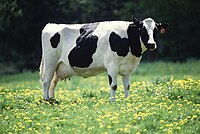
Photo from wikipedia
Abstract Probiotics, prebiotics, and synbiotics have been proposed as safe additives in animal feeding. The purpose of this study was to assess the effect of supplementing corn-soybean diets of laying… Click to show full abstract
Abstract Probiotics, prebiotics, and synbiotics have been proposed as safe additives in animal feeding. The purpose of this study was to assess the effect of supplementing corn-soybean diets of laying hens with dry whey powder (prebiotic), Pediococcus acidilactici (probiotic), and the combination of both (synbiotic) on the productive performance, egg quality traits, and cecal microbial counts. A total of 300 laying hens, 57 wk of age, were randomly allocated to floor pens for 70 d. Pens were assigned to 1 of 4 experimental diets with 5 pens per treatment and 15 laying hens per pen. The experiment consisted of a 2×2 factorial arrangement of treatments with 2 levels of inclusion of dry whey powder (WP, 0 and 60 g/kg of diet) and 2 levels of P. acidilactici (PA, 0 and 2 g/kg of diet). Cecal counts of Bifidobacterium spp. were increased with the addition of WP (8.4 vs. 6.5 log10 cfu/g cecal content, P=0.012). An interaction between levels of WP and PA was found on egg production (P=0.008) and on cecal counts of Clostridium perfringens (P=0.047), so that the addition of WP increased egg production (82.5 vs. 75.6%) and reduced Clostridium perfringens colony counts (4.3 vs. 5.8 log10 cfu/g cecal content) only when PA was not used. In conclusion the joint addition of WP and PA in hens’ diets during the late stage of production did not improve productive performance or change the cecal microbial population. However, the addition of WP increased Bifidobacterium spp. cecal counts and only reduced the Clostridium perfringens counts together with an increase on egg production, when PA was not added.
Journal Title: Livestock Science
Year Published: 2017
Link to full text (if available)
Share on Social Media: Sign Up to like & get
recommendations!